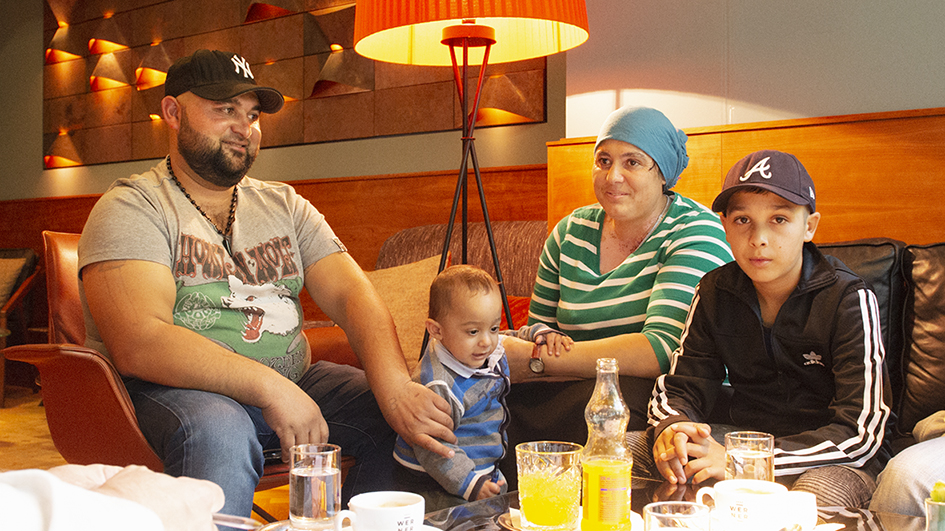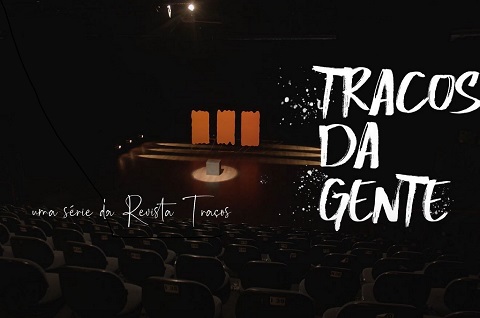By Christoph Janacs, Apropos
As they enter the hotel lobby, the room becomes big and light.
Elena Onica, a 39-year-old who was born in a village near Bucharest, is wearing a dark blue skirt and a white and green striped blouse. Her black, lustrous hair is twisted under a blue headscarf, which she later takes off towards the end of our conversation so that she can wear her lovely hair loose. Fagaras Banu, 34, from Transylvania in Romania, is wearing jeans and a t-shirt featuring multiple prints and a white wolf’s face with a wide-open mouth. His forever friendly, smiling face is adorned with an attractive short, black beard. The couple are accompanied by their 11-year-old son, David, who, as they tell me later, is finally living with them here and not with his grandmother in Romania, and six-month-old Jakob—a lively, extremely curious and bright child, who runs his parents off their feet. They’re all beaming. Finally, they’re all united. They’re just missing one person: Jakob’s twin sister. She had to stay behind and is being looked after in a hospital in Romania. She was born prematurely and, unlike her twin brother Jakob, is disabled and needs additional support.
Elena and Fagaras are exceptionally open people. They talk confidently, assisted by Doris, the interpreter, who readily provides me with additional information if the couple’s narration comes to a halt or Jakob commandeers everyone’s attention. They both come from simple circumstances. Any form of education after primary school wasn’t possible and so Banu hired himself out as a skilled, artisanal day labourer from the outset. The couple eventually made their way to Salzburg in the hope of a better life; it was somewhere where they didn’t have to queue up in the search for work or rely on improvised ways of earning a living, which mostly hadn’t been enough to support themselves. They wanted a life where they could both have a steady income and a stable, dry roof over their heads.
Elena has been married before, but a 10-year marriage without any children meant that she was a disgrace to both her family and her homeland. After her separation, Elena and Fagaras got together and finally—after several miscarriages and premature births—the couple have children together. Children mean happiness, but also problems as they aren’t insured in Austria. They have to go back to Romania for medical treatment or operations. That, again, costs money—a lot of money—and it isn’t easy to afford such trips with the money that the couple earn from selling the street paper Apropos. Another job, alongside their work as Apropos vendors, would make things a lot easier. However, a permanent position would complicate matters or increase the price of childcare. It’s a vicious cycle that it’s difficult to break out of.
The sunny mood briefly clouds over as the couple talk about these matters, but it lasts for only for a few moments. Soon, Elena and Fagaras are laughing again, their joy fuelled by tiny Jakob’s sweet disposition.
I had prepared lots of questions before meeting the couple that now all seem trivial or inappropriate, but I still want to ask them a few things.

What are they both thinking when they walk through the streets of Salzburg: what’s going through their heads? Fagaras cocks his head to think, before saying: “Hopefully everything will be okay. In terms of bringing up the children and looking for a job.” Elena doesn’t think for long: “A beautiful flat, that would be something.”
What does home mean for them both, I ask. This time, it’s Fagaras who doesn’t need to think for long. “Romania!” he says happily. Elena smiles: for her, Salzburg has become home. She’s been here since 2001 and would like to stay here as long as there aren’t going to be any problems with health insurance. If only her baby wasn’t lying in a hospital in Romania, so far away from her.
Then I ask a stupid question that exposes me as a naive, or more likely ignorant, Central European who has no idea about the world in which his interviewees live. What does Europe mean to them both? I receive an uncomprehending look from Fagaras, but it says more than any words could express. And Elena? “Lots of people,” she replies. My goodness, I think. How stupid am I?
I ask a final question; a last-ditch attempt to redeem myself. What does happiness mean for them both?
Elena replies that, for her, happiness would mean that all her problems were solved. Fagaras tells me that happiness would mean that all of his family were healthy. Then he pauses to think about what else brings him happiness. “That there is Apropos,” he adds.
Elena would love to have a job where she could work half days so that she could have enough time to be with her children. She also hopes to have a job that would allow her leave for two or three weeks so that she could go and see Sara-Elena, her baby who is lying in a distant hospital room without her mother.
And then another sentence is uttered, but I don’t know who said it or whether my subconscious is playing a joke on me and no one actually said it. Perhaps it was just my own inner voice that captured the energy between the couple and condensed it into one sentence: they’re both at home in their nomadic existence.




















